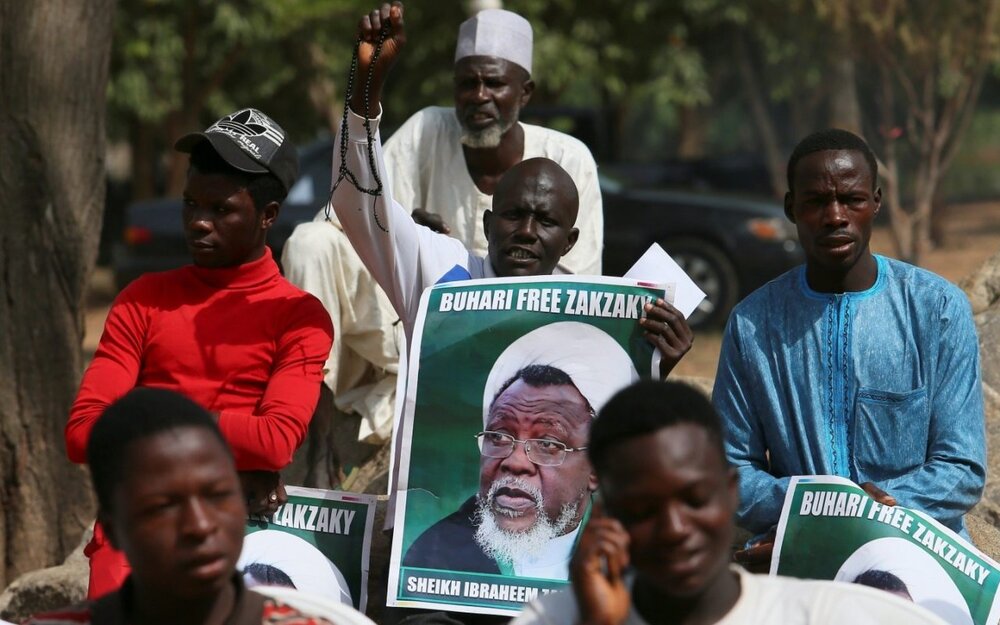Delay in Zakzaky’s case unjust, inhuman

TEHRAN - The leader of the Islamic Movement in Nigeria Sheikh Ibraheem El-Zakzaky, who has been battling for critical health issues, was scheduled to appear before the Kaduna State High Court on Wednesday for a hearing to allow him to travel to India for medical treatment.
Over the past few weeks protests have erupted in many countries as a result of a medical report published by a team of doctors led by Islamic Human Rights Commission that found high toxicity levels in the body of ailing Sheikh.
The court proceedings started around 9 AM in the morning where Sheikh Ibraheem El-Zakzaky was represented by Advocate Femi Falana San. The session started with the plaintiff expressing the urgency of the matter citing Sheikh’s health condition. The government counsel complained the late submission of the ‘bulky’ medical report asking for more time, which the judge rejected saying that the claim of the report being bulky was untrue.
After a round of arguments from both sides and despite plaintiff describing Sheikh’s deteriorating health condition and stating that Sheikh hadn’t slept for seven consecutive days, the court was adjourned for eleven days. The next hearing is now scheduled for 29th of July.
This delay in judgment comes at a time when Sheikh is in critical health condition and is in need of immediate medical attention.
In an interview published earlier by Zainabia Channel, orthopedic surgeon Dr. Taufeeq Panjwani, one of the members of the medical board that was sent to examine Sheikh, said: ‘We recommended the Nigerian government to allow Sheikh to leave Nigeria for medical treatment as the level of lead toxicity in the Sheikh’s body is very high.’
The Nigerian authorities may allow Sheikh to travel abroad at a later time, but the simple act of delaying the procedure might cause numerous complications in his health. As per the report by the IHRC medical team, one of Sheikh’s eyes is completely damaged, while the other one only has 20 percent vision left. This might be a result of the tragic incident when his residence was raided by the Nigerian army back in 2015, murdering three of his sons and assaulting him.
There are high possibilities of government interference in postponing and delaying his case in hope of minimizing the international pressure. Amnesty International Nigeria’s Interim Director Makmid Kamara made a statement in 2017 hinting at that.
He was quoted saying that ‘El-Zakzaky is being unlawfully detained. This might be a part of a wider effort to cover up the gruesome crimes committed by members of the security forces in Zaria in December 2015 that left hundreds dead.’
The Chairman of the Free Zakzaky Campaign Committee Mr. Abdurrahman Abubakar Yola issued a press statement to thank the international activists and allies supporting Sheikh’s cause and stated that ‘when it mattered the most, the court ducked and failed to stand for truth and justice against tyranny and impunity.’
He further added that ‘the applicants are known to be very ill in detention, consequent on the brutal wounds inflicted on them by the state agents in the name of the Nigerian army, the resultant prolonged dehumanizing detention in the custody of the Department of State Services and the obvious poisoning of the Sheikh. .. He has now found to have more than twenty times the toxic levels of lead poison in his body!’
‘Even today, both were unable to walk to the courtroom and had to wait outside while the case went on. In spite of all these, the court has once again allowed the government to kill these innocent people by installments via unnecessary delays,’ said Yola.
Despite its importance, the delay in the case with Sheikh's deteriorating health might not be the only pressing issue regarding him at the moment. There is a chance that an ultimate ruling by the court allowing him to leave the country for treatment may not be implemented at all.
The fact that a 2016 ruling by the Federal High Court in Abuja that ordering the release of the Sheikh and his wife within 45 days was disregarded by the Nigerian government leaves little hope for a future verdict allowing his international travel for medical purposes to be put into effect.
Justice delayed, as they say, is justice denied.
